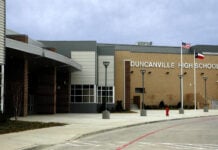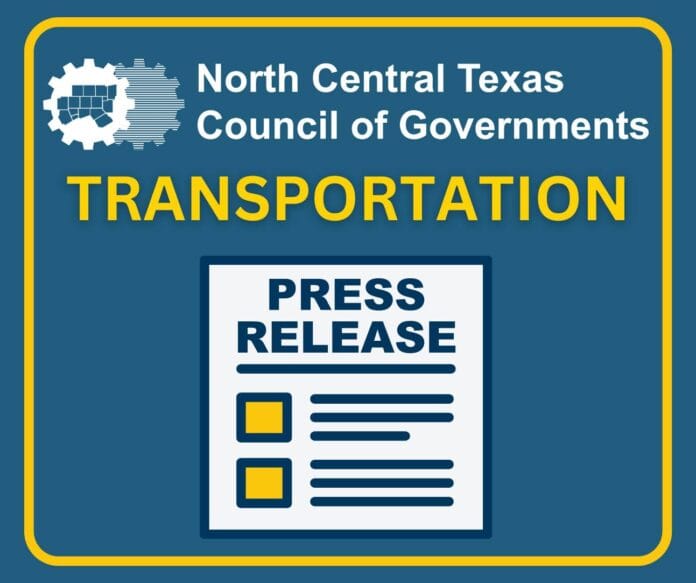(Arlington, TEXAS) – The North Central Texas Council of Governments Executive Board has approved contracts with two consultants to help transportation managers, board members and elected officials develop a next generation transit system for the region. McKinsey & Company and InfraStrategies LLC will be paid approximately $2.2 million to help design a system that accommodates the North Central Texas of the future. The Executive Board authorized payment of $980,000 to McKinsey and $1,212,200 to InfraStrategies. Two consultants were chosen because they each offer different expertise implementing the seven distinct project tasks outlined in the proposal.
The Dallas-Fort Worth area is served by three existing public transportation providers: Dallas Area Rapid Transit, Denton County Transportation Authority and Trinity Metro in Fort Worth. The 12-county metropolitan area has a population of over 8 million people and is forecast to grow to more than 11 million by 2045. Much of the projected population surge is expected to occur outside existing transit authority service areas, requiring an innovative approach for moving people across the region in the future.
The study to explore Regional Transit 2.0 aims to examine crucial transportation investments that could accommodate the anticipated population growth and support sustainable development across the region while also serving cities that lack the sales tax capacity to join one of the three traditional transit providers. Thirteen DART member cities pay a one-cent sales tax to belong to the transit authority. The cities of Denton, Highland Village and Lewisville pay a half-cent sales tax to support DCTA. Trinity Metro has two member cities – Fort Worth and Blue Mound – that pay a half-cent sales tax. Grapevine pays three-eighths of a cent to support TEXRail commuter rail service. North Richland Hills also belongs to the partnership.
In developing a plan for transit through 2050, the Transit 2.0 study will:
1. Develop a transit legislative program
2. Develop strategies to increase transit authority membership
3. Develop collaborations between existing transit authorities
4. Develop strategies for authority board partnerships and teamwork
5. Develop strategies for infill development
6. Review fare-collection strategies
7. Develop recommendations for the transit authority-member city paradox
In a letter to members of the Regional Transportation Council, the mayors of 12 Dallas-Fort Worth area cities and the chair of Dallas Regional Mobility Coalition requested the RTC commit to examine how public transportation can evolve to meet the needs of the region.
“As member cities of a transit authority, we acknowledge and embrace that the growth of the region requires an efficient transit solution in order to provide predictable, cost effective, and reliable mobility for residents and businesses,” the letter stated. “We believe a comprehensive study is needed to assess the effectiveness of regional transit today and what regional transit should look like for the next 40 years.”
The transit authorities have a history of working together, including the following examples:
- DCTA’s A-train commuter rail and DART’s Green Line light rail meet in Carrollton.
- Trinity Metro and DART jointly own, operate and maintain the Trinity Railway Express commuter rail corridor between Dallas and Fort Worth.
- Trinity Metro and DART both offer rail service to Dallas Fort Worth International Airport.
- Trinity Metro and DCTA serve the vicinity of Alliance Airport with bus service.
The Transit 2.0 initiative would enhance their partnership. There may be opportunities for the transit authorities to coordinate services, equipment and fare structures to create a more seamless experience for customers. Additionally, there should be an effort made to find economies of scale on expenses such as operating costs, additional capital costs and capital asset replacement.
“The current transit model has served this region well for 40 years. Our valued transit authorities have forged partnerships that have helped create a seamless experience for many North Texans,” said NCTCOG Director of Transportation Michael Morris, P.E. “Our expansive growth gives us an opportunity to broaden our approach to moving people. Through close coordination, Dallas-Fort Worth has established a world-class transportation system that gives residents multiple options for how to move around the region. Transit 2.0 can ensure as we continue to grow in the coming decades, we are safely and efficiently connecting people to where they live, work and play.”
About the North Central Texas Council of Governments:
NCTCOG is a voluntary association of local governments established in 1966 to assist local governments in planning for common needs, cooperating for mutual benefit and coordinating for sound regional development.
NCTCOG’s purpose is to strengthen both the individual and collective power of local governments and to help them recognize regional opportunities, eliminate unnecessary duplication, and make joint decisions. NCTCOG serves a 16-county region of North Central Texas, which is centered in the two urban centers of Dallas and Fort Worth. Currently, NCTCOG has 228 member governments including 16 counties, 169 cities, 19 school districts and 27 special districts. For more information on the Transportation Department, visit www.nctcog.org/trans.
About the Regional Transportation Council:
The Regional Transportation Council (RTC) of the North Central Texas Council of Governments has served as the Metropolitan Planning Organization (MPO) for regional transportation planning in the Dallas-Fort Worth area since 1974. The MPO works in cooperation with the region’s transportation providers to address the complex transportation needs of the rapidly growing metropolitan area. The Dallas-Fort Worth metropolitan area includes Collin, Dallas, Denton, Ellis, Hood, Hunt, Johnson, Kaufman, Parker, Rockwall, Tarrant and Wise counties. The RTC’s 45 members include local elected or appointed officials from the metropolitan area and representatives from each of the area’s transportation providers.














